Andhra Pradesh AP Board 5th Class EVS Solutions 5th Lesson Agriculture Textbook Exercise Questions and Answers.
AP State Syllabus 5th Class EVS Solutions Lesson 5 Agriculture
I. Conceptual Understanding:
Question 1.
What is cultivation?
Answer:
Cultivation is the process of caring for or raising plants. It is an agriculture practice, involving the production of food by preparing the land to grow crops on a large scale.
Question 2.
Is it good to use chemical fertilizers and pesticides? Why?
Answer:
It is not good to use chemical fertilizers and pesticides. Indiscriminate use of chemical fertilizers and pesticides causes diseases like cancer. It is also harmful to the environment.
Question 3.
What are the advantages of preserving food grains?
Answer:
- By preserving food grains we can use them throughout the year.
- We can use these grains as a surplus to earn money.
- We can use them when there is scarcity in future.
![]()
II. Questioning and Hypothesis:
Question 4.
What questions would you ask a farmer in our village to know about paddy cultivation?
Answer:
- What are the steps involved in cultivation?
- Do the process of cultivation same for different crops like paddy, cotton, mango?
- Which tools are used by farmers in cultivation?
- What precautions we should take to get good yield?
III. Experiments and field observations:
Question 5.
Sow the seeds of coriander or fenugreek nut in your garden at home. Observe the growth of the plants for two weeks. Measure and record the height of the plant in your note book.
Answer:
Student activity.
IV. Information Skills & Project Work:
Question 6.
Meet some farmers in your locality and collect the following information and fill the table?
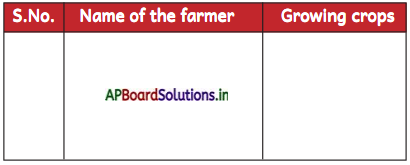
Answer:
Student activity.
V. Drawing Pictures and Model Making:
Question 7.
Draw and label life cycle of butterfly and frog.
Answer:
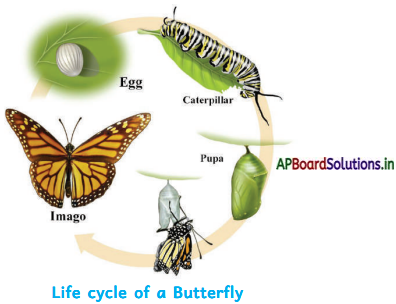
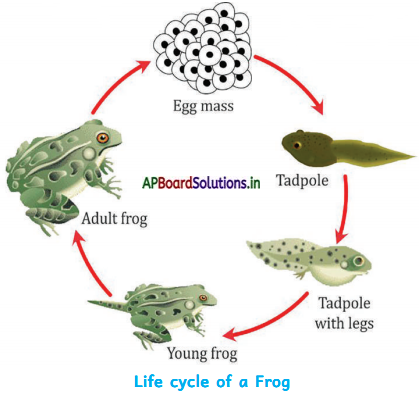
![]()
VI. Appreciation:
Question 8.
Grow micro greens of green gram, mustard, black gram, millets, sesame etc., in paper cups and prepare delicious food items with the help of your mother.
Answer:
Students activity.
Question 9.
Persons and institutions behind the rice we eat in the given format.
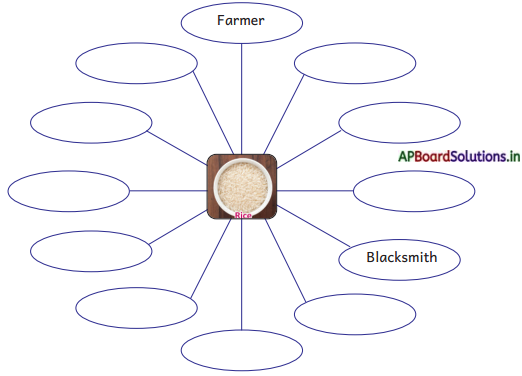
Answer:
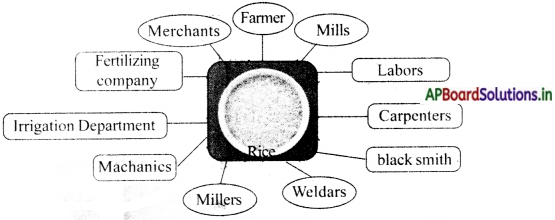
Students activity.
![]()
Additional Questions:
Question 1.
What are the steps involved in cultivation of paddy?
Answer:
Steps involved in cultivation of paddy :
- Prepare field for cultivation by ploughing.
- Watering & leveling the field.
- Planting seedlings.
- Water frequently.
- Supply nutrients through compost and fertilizers .
- Preventing crops from diseases by using pesticides.
- Harvesting paddy.
- Paddy dried, grains are separated from the straw by threshing.
- Separation of husk by winnowing.
- Paddy packed in gunny bags and stored in godowns.
Question 2.
What are the methods used for supply of water to the fields?
Answer:
The supply of water to the fields for cultivation are four types.
- Field irrigation : Supply of water to the field when rainfall is not enough.
- Furrow irrigation : Furrows and trenches are dug in the field and water is supplied through channels.
- Srinkler irrigation: Supply water in a controlled manner in a way similar to rainfall.
- Drip irrigation : Water pipes have holes throw which water drips in the soil.
![]()
Question 3.
Name some tools used in agriculture?
Answer:
Plough, Grape hoe, Rake. Sickle, are the tools used for agriculture.
Question 4.
What is orgainc farming and what are its advantages?
Answer:
Organic farming is a method of crop and livestock production that involves natural and conventional ways of farming. In this process organic manures such as cattle waste, vermicompost, oil cakes and biological wastes are used.
Advantages:-
Reduce pollution, conserve water, reduce soil erosion, increase soil fertility and use less energy.
Question 5.
Draw the life cycle of rice plant?
Answer:
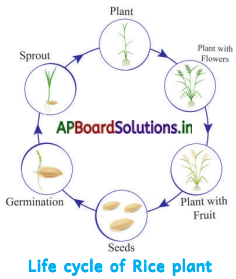
Question 6.
Arrange the stages of cultivation in a sequential order?

Answer:
Students activity.
![]()
Choose the correct answer:
Question 1.
We should eat ________ food.
A) healthy
B) ill-healthy
C) a & b
D) none
Answer:
A) healthy
Question 2.
________ gives us energy & health.
A) Field
B) Work
C) Food
D) None
Answer:
C) Food
Question 3.
Baby frog is ________.
A) frog
B) tadpole
C) caterpiller
D) none
Answer:
B) tadpole
Question 4.
Orgainc fanning is called ________.
A) artifical farming
B) zero budget natural farming
C) fanning
D)none
Answer:
B) zero budget natural farming
Question 5.
Usage of pesticides is harmful to the ________.
A) plants
B) crops
C) pollution
D)none
Answer:
C) pollution
![]()
Question 6.
________ is the major food crop in Andhra pradesh.
A) Rice
B) Wheat
C) Maize
D) Pulses
Answer:
A) Rice
Question 7.
________ % of people main occupation is agriculture.
A) 60%
B) 62%
C) 70%
D) 40%
Answer:
B) 62%
Question 8.
India is the ________ largest producer of rice wheat.
A) first
B) second
C) third
D) none
Answer:
B) second
Question 9.
________ gives us energy.
A) Carbohydrates
B) Proteins
C) Minerals
D) None
Answer:
A) Carbohydrates
![]()
Question 10.
The food contains all nutrients in correct proportion is called ________.
A) Balanced diet
B) diet
C) food
D)none
Answer:
A) Balanced diet